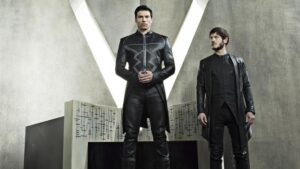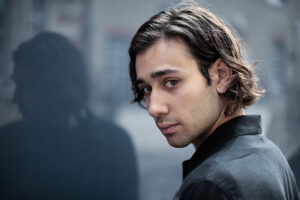The eagerly-anticipated sequel to 2014’s blockbuster Maleficent has a slow-paced, sluggish story that rarely, if ever, matches the splendor of beautiful visuals bursting in rainbow hues on the screen. Having strayed so far from the original fairytale that the occasional name-drops of “Sleeping Beauty” are actually jarring, Maleficent: Mistress Of Evil lacks a clear narrative purpose, but makes up for that with stunning beauty, fabulous world building, and the power of Angelina Jolie’s knife-edged cheekbones.
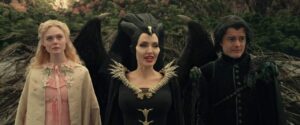
Never underestimate Jolie’s ability to carry a scene, or even an entire movie, with the sheer force of her presence alone. She commands any scene she walks (or flies) into, and her physicality conveys the depths of her emotions far better than any of the rather poorly-written dialogue she is given. She’s still not really the Maleficent that most Disney fans are familiar with, and she’s never likely to be, except in those behind the scenes photos and videos that somehow give off more classic Mal vibes than anything in the actual movie: but what we get from Jolie is just as good – a raven-dark persona with a heart of gold, wielding height, severity, and an impressive wardrobe. In short, she’s the witch-mood, without actually being a witch. Jolie is only rarely able to make much use of the CGI wings her character is burdened with, but does achieve some form of composure when she’s in flight or descending with the force of a small helicopter (on the other hand, her “hovering” scenes leave much to be desired). Nonetheless, she’s still able to do more with them than her co-star Chiwetel Ejiofor, who fights a losing battle with the wings of his troubled Dark Fae character, Conall, for most of the movie. While it’s Conall who carries Maleficent to safety early in the film’s run-time, it’s Maleficent who returns the favor and carries the entire movie in her clawed grip, though she has so little competition until Michelle Pfeiffer’s Ingrith heats up the forges of war, that it’s hardly a surprise.
In the first half of the movie (the weaker half), the script leans heavily on the “romance” between Elle Fanning’s Aurora and Prince Phillip of Ulsted (Harris Dickinson), two of the most boring and frustratingly naive people to ever step foot in a Disney movie. Fanning has her moments, but the role is so underwritten in this movie that she doesn’t get much time to do anything in particular: almost at once, she is forced to neglect her only duties as Queen of the Moors when Phillip proposes to her, and so we never get to see her develop a close relationship with her subjects – as the leader of an entire nation, she fails spectacularly, attempting to have peace for peace’s sake, without considering any of the subtleties involved with aligning oneself with a foreign and possibly hostile power. As for Phillip, he shows up every so often in a loose-fitting shirt to stare dreamily into the camera, as Disney princes so often do: his only concern in the movie is Aurora’s safety, and he too is thwarted so many times, and so dramatically, that he’s an almost laughably pathetic addition to the cast. There is no chemistry whatsoever between the two, who spend almost every scene together talking wistfully about fairy politics – hardly romantic material.
Then, Ingrith gracefully steps onscreen, haughty, cool, calculating and formidable in a pair of diamond-encrusted high heels and a pearlescent gown, and for one brief, shining moment in the faux Camelot constructed for the film, the violent, power-hungry Queen appears to be one of Disney’s best villains in recent history. She handles a loaded crossbow with ease and assurance, goes through extensive costume-changes that showcase her wealth and luxury, keeps a collection of creepy mannequins, and is accompanied by a black cat: a more classic formula for a villain could not be imagined. But it’s the execution of Ingrith’s power-play that causes things to fall apart: while the heartless queen (speaking of heartless, I give it a couple of years before Ingrith shows up in a new iteration of the Kingdom Hearts Disney video game franchise) should have been an easy parallel to the caring mother that is Maleficent, the movie largely misses the mark with Ingrith, never quite using her (admittedly vicious) ambition to the full potential, never quite exploring the depths of her hatred for fairy-kind. She nearly gets there! She has a striking visual style, looking for all the world like the White Queen off a chess-board of death, and an intricate plan to establish total control of the fairy realm. She is certainly an active character, driving much of the plot, and she’s not afraid to get her hands dirty with the blood (or magical dust) of innocents – and yet the film establishes her as so aloof, so high and mighty, that she never actually seems involved in the action she’s causing: not until she’s threatened, and in a place of weakness: and, well, who wants that? She could have made for an incredibly fun villain, one operating from the topmost pinnacle of the impossible heights of her CGI cathedral – but to achieve that, she would need effective servants, loyal to her cause. And the only one who fits the bill is her henchwoman Gerda (Jenn Murray), who is in absentia during the third act due to a sudden fit of musical ecstasy that sees her transform into a crazed, sadistic prodigy of Mozart. The scene in which this happens is one of the most memorable in the entire film, just for the absolute craziness of the scenario, but it does rather undermine Ingrith’s own control over the hearts of her servants (the rest of whom might betray her at the drop of a hat).
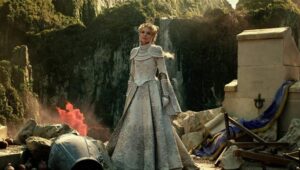
But craziness is what keeps Mistress Of Evil aloft for as long as it does, right up until a predictably average ending. Whether we’re watching Gerda tickle the ivories and take down waves of innocent fairies (there’s a surprising amount of death in this movie!), or witnessing the rituals of the Dark Fae with their vast, multi-colored wings and distinctly unique cultures, there’s always something to look at – occasionally so many things at once, such as when Maleficent first soars through the realm of the Dark Fae – that it’s hard for one’s eyes to focus, there’s just so much. In terms of visual spectacle, the film outdoes itself time and time again, culminating in a final battle that is actually surprisingly engaging and emotional, and sees humanity pitted against the Dark Fae in a war for peace.
There’s a lot of stuff going on in Mistress Of Evil, and thus a lot of themes and messages that the story tries to get across, with varying degrees of success. One line of dialogue delivered at the end of the movie attempts to sum everything up by saying that “we’re not defined by where we’re from, but by whom we love”. But in my opinion, no dialogue from the imaginations of scriptwriters Linda Woolverton, Noah Harpster and Micah Fitzerman-Blue can achieve what is already being said countless times throughout the movie, without a single word spoken: that the entire story is focused on the mother/daughter relationship between Maleficent and Aurora. War rages around them, and this time between them, they are parted and reunited, but they endure. And the vividness with which their relationship is realized is a stark contrast to the flimsy connection between Ingrith and her son, which is nothing more than a shapeless concept that goes nowhere: as I previously noted, there was plenty of potential for a parallel there, but the film loses its one and only chance to demonstrate this parallel by not having Ingrith ever try to kill her son or even hinder his actions very effectively, despite how many chances she gets, and how much motivation she would have for doing so: yet it seems like such an obvious choice, in light of what else happens in the movie, that I can’t imagine that it was never discussed.
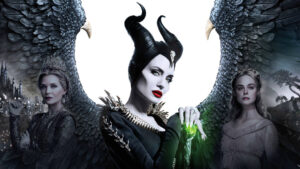
One of the most interesting elements of the entire Maleficent franchise is its focus on femininity, and a different kind of strong female character than is usually seen in modern film: the three women at the heart of Mistress Of Evil are diplomats and politicians rather than warriors – even Ingrith, unabashedly a warmonger, only bears arms under dire circumstances; for most of the film, she exercises her power either from behind or atop a throne. Maleficent, meanwhile, moves in the shadows, preferring wars of wit to open conflict: and as for Aurora, she is sunny, optimistic and gentle, ruling with kindness and tender compassion. Yet all three are rightly considered powerful forces in the world they inhabit, as queens and unchallenged guardians of their respective plots of land. And there is one female character (no spoilers!), who has only a small role throughout the film, but a critical part to play in the third act: the culmination of her arc has a ripped-from-the-headlines quality that is at once startling, heartbreaking, and thought-provoking.
With so much progressive, forward-thinking messaging going on, there is one notable instance that stands out to me as either a bad – and unintentional – decision on the filmmakers’ part, or a conscious decision with a third film in mind (a third film that will only happen if Mistress Of Evil takes off at the box-office): and that decision is putting humans in control of fairies. It screams of colonialism every time it gets brought up, and the film outright denounces it, but never actually does anything about it when it’s Aurora, our heroine, doing it. Queen Ingrith has a point when she tells Aurora that there’s more to ruling a kingdom than running around barefoot with flowers in one’s hair – but, well, Ingrith is evil, so obviously Aurora doesn’t actually heed her warning or do anything to remedy the glaring problem. She’s simply not a very effective queen, and she spends probably ten minutes (at most) with her own people – but we’re supposed to trust that she’s the best person for the job because…she left the fairies in the lurch while she went off to plan her wedding? She angered Maleficent and caused her to leave the moors unguarded against human threats? She did basically nothing for the rest of the film? The film never adequately explains why a human should be allowed to rule fairy affairs, and the open hostility from the Dark Fae makes one wonder if everything will really be fine and dandy after Aurora’s marriage to Phillip firmly establishes that more, not less, human interference is on the horizon.

However, unlike some films, Maleficent: Mistress Of Evil successfully stands on its own, requiring no previous knowledge of the franchise to follow along with its plot and leaving no cliff-hangers or unresolved storylines to torment the viewer afterwards – all in all, this movie is not what I would call necessary viewing, but it is fun, beautiful and spectacular. And it has got Angelina Jolie and Michelle Pfeiffer together onscreen, which is itself worth the price of admission.
Movie Rating: 5.0/10
